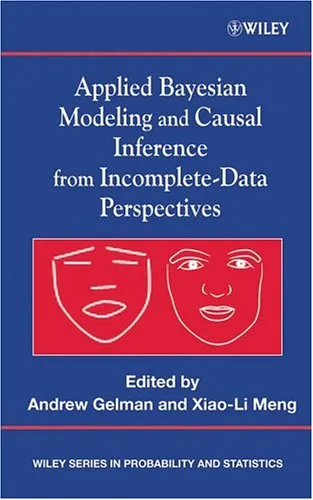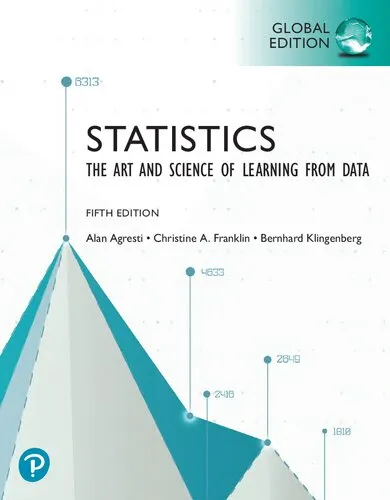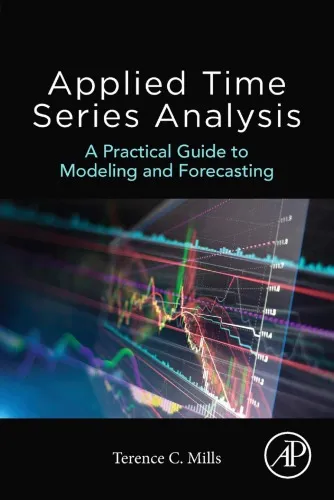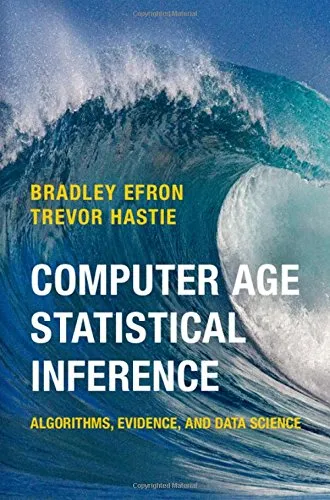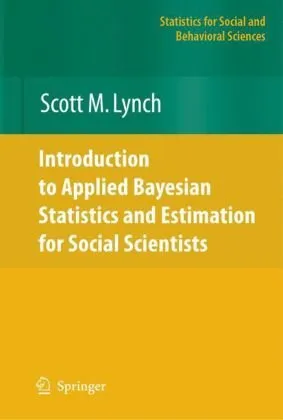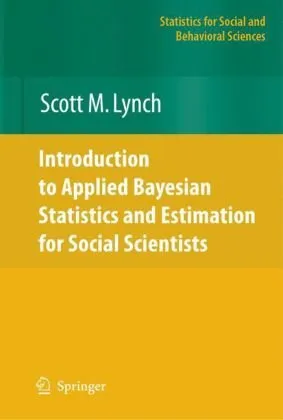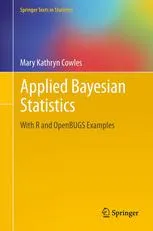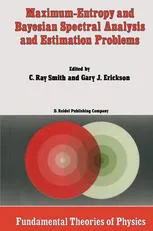Applied Bayesian Modeling and Causal Inference from Incomplete-Data Perspectives (Wiley Series in Probability and Statistics)
4.5
Reviews from our users

You Can Ask your questions from this book's AI after Login
Each download or ask from book AI costs 2 points. To earn more free points, please visit the Points Guide Page and complete some valuable actions.Related Refrences:
Introduction to "Applied Bayesian Modeling and Causal Inference from Incomplete-Data Perspectives"
"Applied Bayesian Modeling and Causal Inference from Incomplete-Data Perspectives" is a highly regarded text that merges the worlds of Bayesian statistics and causal inference, specifically addressing the challenges of working with incomplete data. Co-authored by Andrew Gelman and Xiao-Li Meng, this book is a collection of insights, methodologies, and practical strategies rooted in real-world applications. Designed for statisticians, data scientists, and researchers, the book serves as a bridge between theory and practice, helping readers understand and apply cutting-edge techniques in Bayesian modeling and causal inference.
The book is part of the acclaimed Wiley Series in Probability and Statistics and has been written with a strong focus on practical applications. Through a collection of essays contributed by leading experts and practitioners, it explores diverse topics such as Bayesian machine learning, causal inference frameworks, and robust methods for missing data. Whether you are an academic, policymaker, or industry professional, this book provides the tools and concepts necessary to unravel complex systems where data may be incomplete or uncertain.
Detailed Summary of the Book
This book is structured around two main statistical challenges: the integration of Bayesian methods and causal inference while accounting for incomplete data. The fusion of these disciplines provides a richer and more flexible framework for modeling real-world problems. Andrew Gelman and Xiao-Li Meng have compiled contributions that demonstrate the utility of Bayesian approaches in addressing practical issues — from sociology and economics to medicine and engineering.
Key themes include robust solutions to missing-data problems, approaches to nonidentifiability in causal inference, and the application of hierarchical models to large-scale datasets. The theoretical chapters are complemented by accessible case studies, which range from clinical trials to public policy evaluations, giving readers both context and actionable techniques for their own projects. In addition, the book discusses computational aspects of Bayesian methods, including Markov Chain Monte Carlo (MCMC) algorithms and their application to complex systems with incomplete data.
The contributors examine not only how Bayesian modeling can address missing data but how it can yield more reliable causal conclusions by incorporating assumptions explicitly into the analysis. This integration creates a framework that acknowledges uncertainty, leverages prior information, and produces results that are interpretable and robust.
Key Takeaways
- Learn how Bayesian methods can effectively address missing data, often an unavoidable challenge in real-world datasets.
- Discover the intersection of Bayesian modeling and causal inference and how they enhance the interpretability of statistical analyses.
- Gain insight into the application of advanced computational techniques, such as MCMC algorithms, in dealing with noninferential and incomplete datasets.
- Understand how to integrate robust, hierarchical Bayesian models in large-scale studies.
- Explore real-world case studies and actionable examples that highlight practical applications of theory.
Famous Quotes from the Book
"Bayesian methods offer a coherent framework for embracing uncertainty, a feature that is particularly vital when working with incomplete data."
"Causal inference is not just about estimating the effect of one variable on another. It’s about understanding the complex interplay of mechanisms in a system."
"In data analysis, assumptions matter as much as, if not more than, the data itself."
Why This Book Matters
The modern world is inundated with complex datasets, many of which are incomplete or riddled with uncertainty. The need for robust tools to make sense of such data is paramount not only in academic circles but also in industries such as healthcare, finance, and public policy. This book is a critical resource for anyone looking to work at the cutting edge of statistics and data analysis.
"Applied Bayesian Modeling and Causal Inference from Incomplete-Data Perspectives" matters because it equips readers with the skills to tackle real-world problems in a statistically rigorous way. It emphasizes practical and flexible solutions by leveraging the best aspects of Bayesian thinking and causal inference. The clarity and depth of the chapters ensure that even complex methodologies are presented in an easily digestible form, making the book accessible yet comprehensive.
Whether you are a statistician dealing with incomplete experimental data, a data scientist modeling user behavior, or a policymaker evaluating interventions, the lessons in this book will help you derive better conclusions and make more informed decisions.
Free Direct Download
You Can Download this book after Login
Accessing books through legal platforms and public libraries not only supports the rights of authors and publishers but also contributes to the sustainability of reading culture. Before downloading, please take a moment to consider these options.
Find this book on other platforms:
WorldCat helps you find books in libraries worldwide.
See ratings, reviews, and discussions on Goodreads.
Find and buy rare or used books on AbeBooks.
1298
بازدید4.5
امتیاز0
نظر98%
رضایتReviews:
4.5
Based on 0 users review
Questions & Answers
Ask questions about this book or help others by answering
No questions yet. Be the first to ask!
